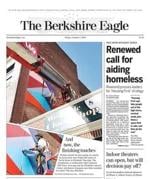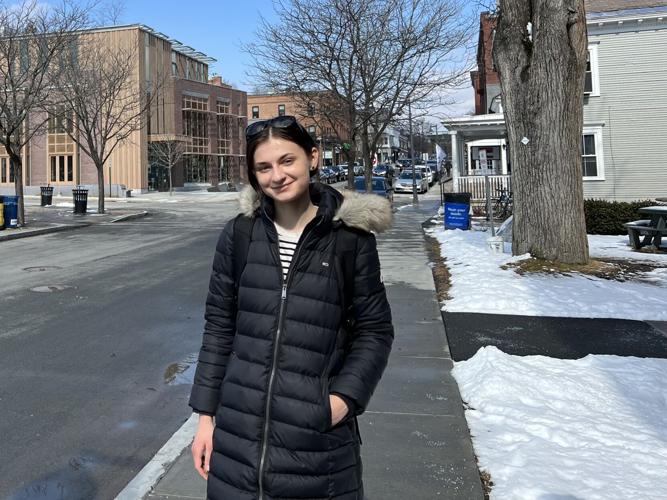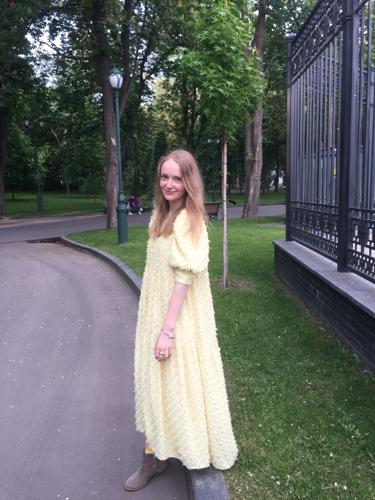WILLIAMSTOWN — Before the Russian military attacked her city, Diana Sobolieva had planned to visit Kharkiv during spring break.
Sobolieva, 20, has not returned to Kharkiv, the city in northeast Ukraine that has become a major target of Russian attacks, since she began studying at Williams College last fall. Since Russia invaded Ukraine on Feb. 24, she and many others have seen images — including some of places where she used to walk by every day — of the destruction, shared in the news media and through Telegram, a messenger app popular in Ukraine.
One showed a Russian missile that landed in the yard of her childhood school. Another showed a missile stuck in the ground less than a mile from her apartment.
“We feel guilty, the survivor’s guilt,” said Sobolieva, who is a 2021 graduate of Miss Hall’s School. “Because it’s just so sad that our parents, our friends are in Ukraine right now, and they have to suffer through it. ... It just feels very strange when we’re going to class when people in Ukraine are in bomb shelters.”
For Sobolieva and Alina Luchyshyn, who was the only Ukrainian student at Williams before this year, the Russian invasion has upended the spring semester. In addition to college coursework, they have taken on new and pressing duties, including keeping in touch with loved ones to make sure they are safe, and organizing events to advocate for peace in Ukraine.
Luchyshyn, 21, a junior biology and German major from the western Ukrainian city of Ternopil, said that her family has left the city for a smaller village, where her mother must walk to the top of a hill to get good enough service to use her phone. In a March 2 piece that Sobolieva and Luchyshyn wrote for The Williams Record, Luchyshyn says that her grandmother refused to leave the country without her cow. That cow, Luchyshyn believes, serves for her grandmother “to reject the seemingly surreal beginning of the war so she can continue living her life as usual — except that it will never be the same.”
“I, of course, prefer them to leave the country, and I’ve been telling them this every single day when I have contact with them, I’ve been trying to convince them,” Luchyshyn said. “I also understand that they’ve spent all their lives in Ukraine, and my grandma spent all her life in the village just doing the same work. ... Additionally, they don’t know English, so that’s why I think if I was in Ukraine right now I actually would be able to help them or assist them with fleeing.”
Sobolieva said that her parents still are in Kharkiv, as is her uncle, who, as a doctor, traveled from Poland to attend to those wounded in the war. Some in her family have evacuated to Poland, although the journey included a driver canceling one scheduled trip to the train station because of heavy shelling that day. Train rides out of the country can take more than 24 hours, and many people must stand.
Blocked ports and heavily shelled roads have made humanitarian aid difficult to deliver, and Sobolieva said that she has heard of people trying to melt snow for water to drink. Ukrainian authorities have said that in Mariupol, a child died of dehydration after her mother died in a Russian attack.
Her biggest fear, Sobolieva said, is that the Russian military would occupy Kharkiv the same way that it has Mariupol or cities in the southeastern Donbas region, where conflict has continued from 2014 to the present between Ukrainian troops and armed pro-Russia separatists backed by Russian troops.
Sobolieva and Luchyshyn were in middle school in 2014, when Russia invaded the Crimean Peninsula in eastern Ukraine. The invasion led to international sanctions against Russia, and in Ukraine, it inspired a mass movement known as the Maidan Revolution, or the Revolution of Dignity, in which Ukrainians ousted the pro-Russian then-President Viktor Yanukovych.
Expressions of national pride around 2014 led Sobolieva to dream of studying political science and becoming an elected leader in Ukraine. Now, she hopes to study math or economics and to work in public policy or development, and the most recent Russian invasion has reinforced her idea that “I would not be able to do something completely unrelated [to helping Ukraine], because it feels wrong.”
Luchyshyn, who hopes to work as a researcher or professor, long has planned to contribute to development in Ukraine related to academia or education. But, recent events make her question whether that will be possible.
“I don’t know now, because at this point, you don’t know if Ukraine is going to be the same again, or how it’s going to work out at all,” she said.
Luchyshyn and Sobolieva said that the most recent Russian invasion has created a glaring gap between the safety of Williamstown and the war raging in Ukraine. Luchyshyn said that seeing children running around, typically an everyday sight, brings intense emotions when she thinks of her younger brother — or her own childhood, which she remembers as a time of joy and peace.

Diana Sobolieva, 20, a first-year student at Williams and a 2021 graduate of Miss Hall's School, said that her best friend lives in Kyiv, Ukraine, after fleeing Donetsk after war broke out there in 2014. “Now, eight years later, they started having a normal life,” Sobolieva said. “They got a new apartment. They got new jobs. They started establishing themselves. And now with Russia attacking, they can lose everything again. They would have to start a new life again.”
The invasion has made it difficult for Sobolieva to approach her coursework with the same focus, she said.
“I just feel like there’s such a big duality between the world where we are here in Williamstown, which is super safe and everything is fine, and we’re taking classes talking about philosophy or art history,” she said. “And then there are people dying somewhere in the world — and not only in Ukraine. Even when the war in Ukraine will end, I feel like I will never be able to look at it differently because I would know that still while we’re doing something, there are people that are suffering somewhere in the world.”
Luchyshyn added that the Russian invasion has led her to feel greater solidarity with other international students whose home countries are facing violence.
“I knew a lot of people, for example, from Palestine or other territories under some political tensions like in Ukraine right now,” she said. “I was always sympathetic to them, but I feel like at this point we’re on the same page.”
Both said that they can see why the U.S. and European nations have hesitated to help Ukraine defend itself, given Russia’s possession of nuclear weapons and fears of escalation. Yet, from their point of view, the danger that their loved ones face leads them to view the situation differently.
“I get how people in the U.S. and in Europe are afraid of escalation, but when you’re literally living in the war and seeing people die, when you’re seeing bombings, seeing the silence is very painful,” Sobolieva said, adding that her father lost a close friend in a Russian attack.
Ukrainian leaders have urged Western allies to impose a no-fly zone, which would require the parties enforcing the zone to commit to shooting down aircraft that enter the space. Most U.S. leaders have opposed the idea, fearing that shooting down Russian planes or threatening to do so could provoke Russian leaders.
Luchyshyn said that she gets the arguments against the idea, but it is difficult for her not to think about the Ukrainian lives that are taken in Russian airstrikes.
“I understand that Western countries don’t want to put themselves at risk, but as a Ukrainian, most of my family and friends are in Ukraine, and I would definitely support a no-fly zone,” she said. “I feel perplexed because, rationally, I understand, but deep in my heart, I really hope for a no-fly zone.”




